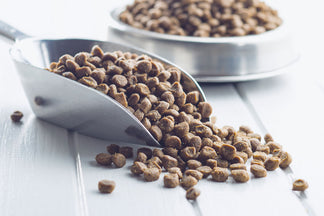The ingredients in your cat’s food could be more important to your cat’s health than you think. Cats use food for energy and to create and replace cells within the body. Essential amino acids are critical to keeping the cat’s body healthy and running smoothly.
What are amino acids?
The cells of all living things are made up of proteins. Amino acids are the building blocks of proteins. The amino acid that a cat’s body needs from food are very specific—they must be the right ones to make the cells in a cat’s body!
A cat’s body is usually capable of creating the amino acids that they need using other amino acids, but sometimes the cat must get a particular amino acid from food. Those amino acids that can't be created are called essential amino acids.
Essential Amino Acids for Cats
There are 22 amino acids that cats use in their bodies. Of those 22 amino acids, 11 are essential amino acids. Those essential amino acids are arginine, methionine, histidine, phenylalanine, isoleucine, threonine, leucine, tryptophan, lysine, valine, and taurine.
One unique feature about cats is that a few of their essential amino acids are only found in animal proteins – taurine and arginine. This means that they must eat meat.
The Effects of Arginine & Taurine on Cats
ssential amino acids may be very small – microscopic – but they have a big effect on our cats.
The effects of arginine on the cat’s body were discovered in studies done in the 1970s. Scientist fed cats a meal that was intentionally deficient of arginine to a group of cats. Within hours cats were suffering from symptoms such as drooling, vomiting, seizures, ataxia (loss of control of the body), and more. One cat died within a day of the arginine deficient meal. It was determined the cats were suffering from ammonia toxicity. Arginine was necessary for the cat’s body to eliminate the ammonia that it creates during the digestive process. Cat owners need not panic, food containing animal proteins will have abundant arginine naturally.
In the 1980’s we found out how important taurine is to a cat’s body when several commercially available cat foods did not supplement their foods with it. Cats began going blind, developing enlarged hearts (dialated cardiomyopthay) and more.
Taurine helps with the following processes in cats:
- Development and maintenance of the retinas
- Development and maintenance of the muscles of the heart wall
- Helps skeletal muscles to function normally
- Helps regulate blood sugar and body weight
- Helps regulate defects in the blood flow that supplies the nerves
- Maintenance of the immune system
- Development of fetuses during pregnancy
Unlike arginine, a taurine deficiency usually takes some time to develop. Symptoms can take 5 months or more to appear. Depending on what damage has already been done, it is possible that a veterinarian can help your cat reverse the affects of the deficiency through treatment. Most commercial cat food comanpies have begun supplementing their cat foods with sufficient amounts of taurine. Talk to your veterinarian if you are concerned about the taurine or arginine content of your cat’s food.

 Food
Food
 Food
Food
 Food
Food
